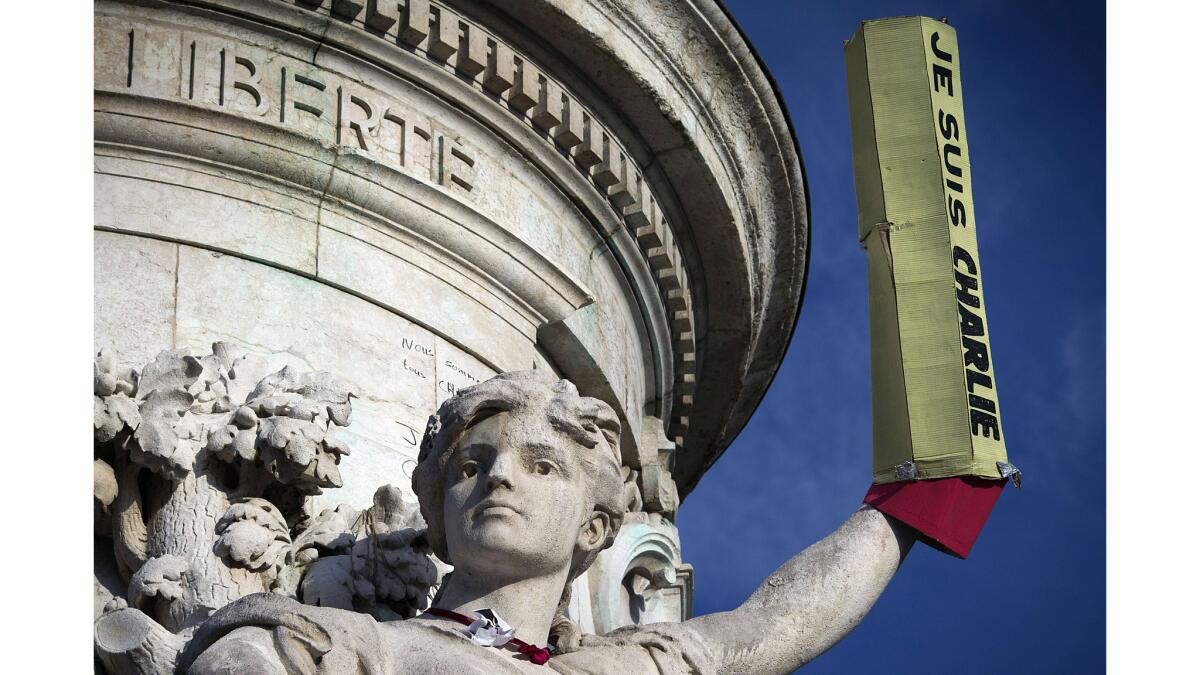Comedians and cartoonist gather to discuss satire and censorship

- Share via
Comedians, writers, satirists and a cartoonist gathered Thursday night at Hollywood’s Upright Citizens Brigade to discuss censorship and satire in the wake of the killings at the offices of the Charlie Hebdo magazine in Paris. But while part of the debate mirrored some of what has been said already on the case — and included a broad condemnation of the violence — there was also an expression of discomfort with the racialized nature of the cartoons that have appeared in Charlie Hebdo.
As stand-up comedian Azhar Usman — the Chicago-born son of Indian Muslims — put it at one point: “[Screw] terrorism and [screw] these racist cartoons.”
Organized by the progressive site Blue Nation Review, the boisterous hour-long conversation (warning: coarse language is used) included comedians Phil LaMarr, Paul Provenza and Usman; political cartoonist Matt Bors; “Daily Show” co-creator Lizz Winstead, and “Family Guy” show runner Rich Appel. They discussed the difficulty of producing satire, the ways in which different ethnicities are depicted in cartoons and whether artists find themselves self-censoring out of fear of reprisal.
But first the panel dealt with what seemed like a simple question: “Are you Charlie?” It quickly became clear that the question has become more complex in the two weeks since the Charlie Hebdo attack.
“It’s an unfair question,” Usman said. It forces “what should be a nuanced conversation,” he explained, into an artificial demand: “‘You’re either with us or against us; you’re either Charlie or you’re not Charlie.’” He ended up defining himself as “an agnostic.”
Bors was similarly conflicted. “As a political cartoonist who has an interest in not dying, I want to say yes,” he said. “But I hate the hashtags... So, no.”
LaMarr and Appel had few qualms about the question: “I was Trayvon, I was Michael Brown, I was Yes All Men,” said LaMarr. “Why wouldn’t I be Charlie?”
Appel, however, did discuss the trickier challenge of working on “Family Guy” within an art form whose very intent is to skirt what is acceptable.
“It’s such a complicated question that I can’t even pretend to be able to solve,” Appel explained. “Comedy often offends. Every day at our show — every other day at every show I’ve worked on for 20 years — you skirt those questions. There’s not a clear objective flow-chart you put everything through and you come up with your answer. It’s kind of subjective in a way.”
Winstead said audiences can’t expect to come away from satire without feeling some burn. “You don’t have the right to not be offended,” she stated.
Bors, who has done strips related to the controversy, recently drew a cartoon that featured the prophet Muhammad — to prove that it could be done without resorting to racialized caricature.
“I wanted to do a cartoon that I think any reasonable person can look and is not going to say, ‘This is crazy racist,’” he explained. “The target is not Muhammad. The target is not Islam or Muslims. It’s clearly the killers.”
It was a somewhat unruly discussion, one that could have benefited from a strong moderator. Too often the debate went off the rails into broader subjects — about the media’s portrayal of Muslims and who has said what about the controversy. A more focused conversation about the fine line satirists tread and how that line may or may not shift because of the Charlie Hebdo killings would have been more interesting.
But it was a worthwhile reminder that the Charlie Hebdo attacks were much bigger than a simple strike against satire.
“It’s not like these guys were offended readers,” said Bors toward the end. “There’s a reason why they attacked the magazine, obviously, and it has to do with their controversial cartoons. But it’s not like they were offended readers who couldn’t take it anymore. That’s sort of how we’re acting. It was a terrorist act — done for a reason, to make a statement.”
It’s a statement a lot of artists will be talking about for a very long time.
You can also watch the full discussion (expletives and all) by logging on to BlueNationReview.com.
Find me on Twitter @cmonstah.
More to Read
The biggest entertainment stories
Get our big stories about Hollywood, film, television, music, arts, culture and more right in your inbox as soon as they publish.
You may occasionally receive promotional content from the Los Angeles Times.











